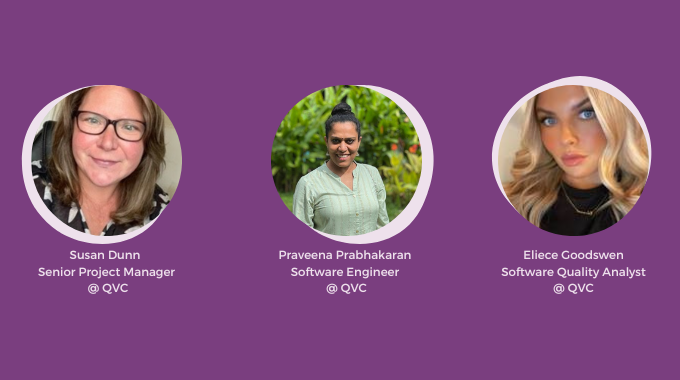
A fast-changing tech industry offers a wealth of career opportunities for women, yet pervasive ideas of who gets into tech, how and why can still act as a barrier— deterring diverse talent and perpetuating a view of the industry as being for those with STEM backgrounds alone. QVC Software Quality Analyst, Eliece Goodswen, Senior Project Manager, Susan Dunn and Software Engineer Praveena Prabhakaran have all had unconventional journeys into their current tech role, challenging stereotypes and drawing on transferable skills to prove that the pathways into a career in tech are as unique as the people taking them…
How did you come to tech in your career journey?
Eliece: I joined QVC nine years ago as an order line rep in the call centre, and pretty much as soon as I started, I became involved, alongside my normal job, in pre-production pilots — where software gets tested in a small pool to provide feedback to the developers. Three years ago, I was asked if I would go on secondment to IT to test the internal systems in the testing environment. In accepting that challenge, I went from being a call centre agent into a technology role almost overnight. When you don’t work in technology, there can be an assumption that everyone in that world is doing the same job. I’m sure there are people in the call centre that still think I’ve left to repair computers! When you’re in the tech space though, you see how many different roles there are and the ways in which tech keeps everything going—and it’s incredible.
Susan: I fell into tech purely because I was good at it at school, so I did a business computing degree at university before coming to QVC as a graduate COBOL developer in 1998. Over the years though, I found I had a natural skill in understanding why we were coding and what we were coding, so I transitioned first into a systems analyst, then a senior business analyst before leaving QVC in 2015 to join the telecoms industry as a Software Designer Manager. I then returned to QVC in 2018 as a Senior Product Owner.
Praveena: I started my working life in Kerala, India as a primary school teacher after graduating with a degree in Malayalam literature. My transition to tech was largely driven by life events: after my marriage my husband was working in a different city to me, but we soon realised the long-distance thing wasn’t going to work and I decided to quit my job to move with him. My husband and brother are both programme developers and I thought this might be a good opportunity for me to get into IT too, so I learned Java programming in six months and got my first job in tech three months later, working in Bangalore for five years before moving to the UK in 2011 to start my role at QVC.
What inspired you to make the leap to—or back to—tech?
Eliece: I wanted a job where I felt my input was most valuable. I don’t have a degree like most people in the IT department, but I think part of the success in transitioning to a tech career is about finding your niche and forgetting the stereotypes. I knew that my internal business knowledge of the systems they were testing was valuable, and for that specific system perhaps even more so than a computing degree would be.
Susan: I wanted to push myself and try something new, but I missed the technical side of my career, so I was enticed back to QVC after three years to take up a role as a Senior Product Manager. I like to ‘get my hands dirty’ in tech and to know why we’re doing what we’re doing. That is what drives me, and the sense of building and owning something and seeing it being brought to life.
Praveena: Self-belief. Teaching was considered a perfect career for a woman in India at the time, as it had job security and plenty of holidays. People questioned how I would manage this career—and when you don’t have support for something you really want to make it a success, so that drove me. I hadn’t even worked on a computer before I started to learn programming, but I kept going and figured out the connections as I went. It’s satisfying when you have that ‘Eureka!’ moment where you understand how everything fits together. From there, the journey gets easier.
What transferable skills have enabled you to be successful in your tech career?
Eliece: I was familiar with the systems I was testing as I used them every day in my previous role. There is nothing like an actual system user to help IT understand how other users will interact with the system. Given my previous role, that crucial business knowledge has been my key transferable skill, land the feedback I’ve had has shown it offers real value to the development team.
Praveena: In literature, you don’t just read the lines in front of you, you read between the lines, and that ability is something that we need in IT and technology, especially when you’re building applications or finding gaps in products. Analytical skills are important, gathering facts, interpreting them, and connecting the dots, all skills I had gained from studying literature while teaching taught me strong troubleshooting and communication skills.
Susan: Moving into management and then back into tech helped me switch on my people skills. Working outside tech, I understood the IT department and had empathy for it in the business because I could see things from both sides. So, when people said, ‘This tech isn’t working,’ I could say, ‘It’s the coding behind the person; not the person’. Perspective is important and coming back to my comfort blanket of tech made me realise how strong my business side was too.
What are the biggest challenges you found moving between a non-tech and tech career?
Eliece: The biggest one was probably learning the language around technology. Words like ‘agile’ and ‘waterfall’ meant nothing to me, and that was scary when I was being asked questions in meetings. The culture at QVC is always about providing support to grow and learn, and when I joined the technology team, I was assigned to people who were going to be able to help me. I still ask them questions to this day.
Susan: While I’d understood the tech landscape when I left it, three years is a long time in this industry, and I had to work to understand what had changed when I came back and get back up to speed quickly. Thankfully, I could ask friends at the company who to go to if there was something I needed to understand. QVC is also good at helping you to upskill through internal training so you can take the next step or even move laterally in the company, with strong encouragement to take learning time out each month for career development.
Praveena: I found the interview process challenging. My first tech job was in development in the publishing industry, and I had multiple interviews over three months to land it. But that in itself helped build my confidence and knowledge level—the more interviews you do, the more you learn, and you can then identify what to do next. People also gave me feedback on where I was strong and areas I needed to focus on. It’s important not to get depressed if you are rejected for tech roles initially, as it’s all an opportunity to learn more.
What is the most rewarding thing that a career in tech at QVC offers you?
Eliece: The ability to be part of a project team making a difference—and even more so because I’ve worked on the other side of the tech. I know the agents I used to work with will be getting better tools that will make their jobs easier.
Praveena: Interacting with international clients and colleagues makes me feel that the world is smaller, and I love the opportunity to travel. As a career, it’s also rewarding financially as well as the flexibility that’s offered by our hybrid work model.
Susan: I love working to understand the scope and the requirements for a piece of software, taking it from the drawing table to building it as a team, testing and releasing it and seeing the business benefit it brings for external and internal stakeholders, from customers to the warehouse teams.



